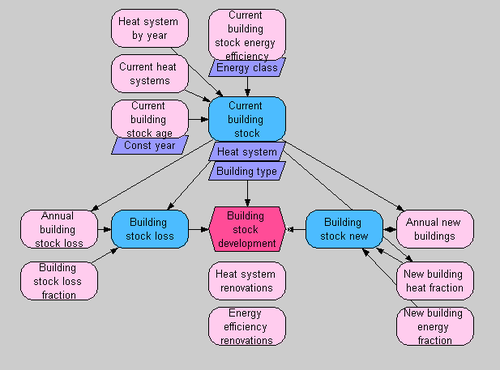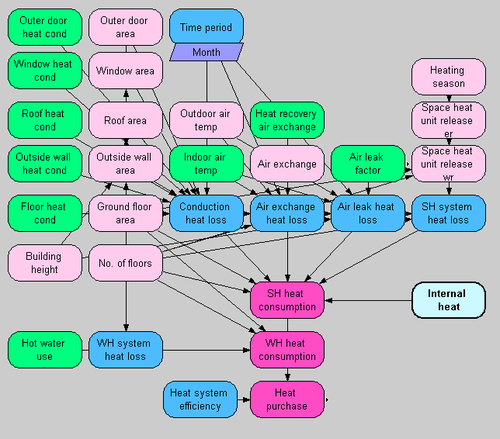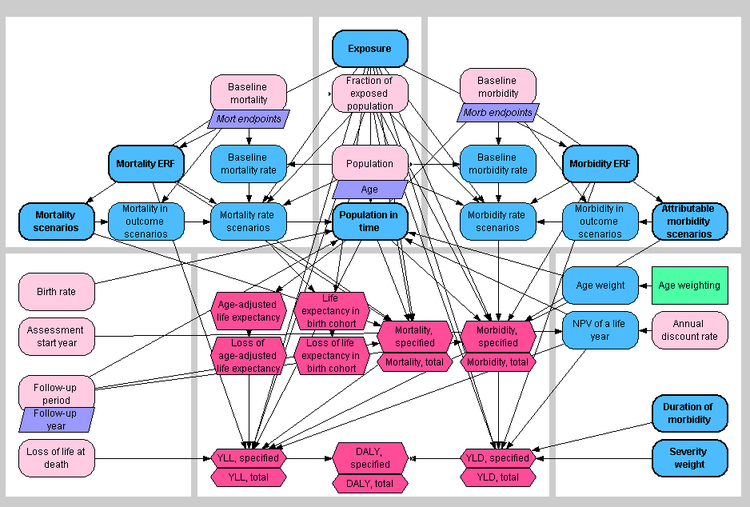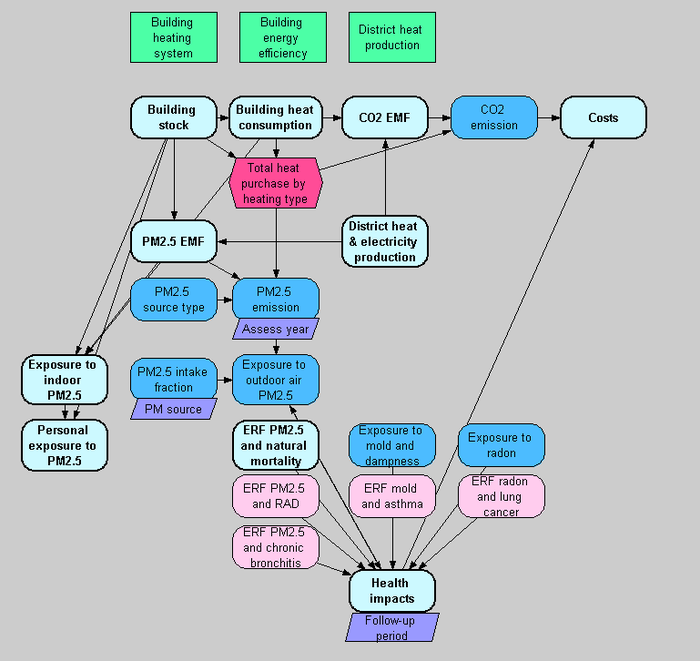CLAIH assessment: Difference between revisions
No edit summary |
mNo edit summary |
||
| Line 41: | Line 41: | ||
**Asthma due to indoor mold and dampness | **Asthma due to indoor mold and dampness | ||
**Lung cancer due to indoor radon | **Lung cancer due to indoor radon | ||
*Other emissions: CO2 | *Other evaluated emissions: CO2 | ||
*Evaluated costs: | *Evaluated costs: | ||
**Costs fron health impacts | **Costs fron health impacts | ||
| Line 54: | Line 54: | ||
**Building energy efficiency improvement options | **Building energy efficiency improvement options | ||
**Building air filtering | **Building air filtering | ||
=== Underlying scenarios === | === Underlying scenarios === | ||
| Line 83: | Line 82: | ||
::[[Image:Claih model.PNG|thumb|700 px|CLAIH model overview]] | ::[[Image:Claih model.PNG|thumb|700 px|CLAIH model overview]] | ||
===Decisions to be evaluated=== | |||
''Society:'' | ''Society:'' | ||
| Line 101: | Line 98: | ||
===Building stock development=== | |||
[[Image:Claih model building stock.PNG|thumb|500 px|Building stock development modelling]] | [[Image:Claih model building stock.PNG|thumb|500 px|Building stock development modelling]] | ||
| Line 112: | Line 109: | ||
===Building heat consumption=== | |||
[[Image:Claih model heat consumption.PNG|thumb|500 px|Building heat consumption modelling]] | [[Image:Claih model heat consumption.PNG|thumb|500 px|Building heat consumption modelling]] | ||
| Line 120: | Line 117: | ||
===Emissions=== | |||
*[[PM2.5 emissions from house stock heating in Finland|PM2.5 emissions from house stock heating in Finland]] | *[[PM2.5 emissions from house stock heating in Finland|PM2.5 emissions from house stock heating in Finland]] | ||
| Line 129: | Line 126: | ||
===Exposure and exposure-response functions=== | |||
'''PM2.5''' | '''PM2.5''' | ||
| Line 170: | Line 167: | ||
===Health impacts=== | |||
[[Image:ICT model.PNG|thumb|750 px|Health impact modelling]] | [[Image:ICT model.PNG|thumb|750 px|Health impact modelling]] | ||
''Health | ''Health impact indicators'' | ||
Calculated for all exposures: | Calculated for all exposures: | ||
| Line 194: | Line 191: | ||
===Costs=== | |||
'''''Citizen:''''' | '''''Citizen:''''' | ||
| Line 204: | Line 201: | ||
'''''Society''''' | '''''Society''''' | ||
*Costs from healt | *Costs from healt impacts | ||
**[[Value of a statistical life (VSL)]] | **[[Value of a statistical life (VSL)]] | ||
**[[Value of a life year (VOLY)]] | **[[Value of a life year (VOLY)]] | ||
Revision as of 12:12, 10 February 2011
| Moderator:Virpi Kollanus (see all) |
|
|
| Upload data
|
Climate change, air quality and housing – future challenges to public health (CLAIH)
Scope
Purpose
The purpose of the assessment is to evaluate the health impacts and costs in Finland in the future if different housing policies are undertaken.
More specifically:
- What would be the health effects and costs in Finland in 2030 if the society preferred different household heating systems, building energy efficiency solutions and fuels for district heat production?
- How would the health effects from housing compared to health effects from other sources of PM2.5, e.g. traffic?
- What would be the optimal combination of household heating systems, building energy efficiency and fuels for district heating?
- What would be the amount of societal subsidies needed to ensure the transition to the preferred heating systems and energy efficiency in housing?
Preference of different decisions on household heating and energy efficiency is assessed from the perspective of a household. Total health impacts and societal costs of different decision options are assessed for the whole of Finland, and the optimal distribution of societal subsidies for different heating systems and energy efficiency are evaluated based on these.
Boundaries
- Population: Finland
- Assessment time frame: 2010-2030
- Evaluated activity: heat production and consumption in household building stock (detached houses, row houses, apartment buildings)
- Evaluated exposures:
- Fine particles (PM2.5)
- Outdoor concentrations
- Indoor concentrations from domestic wood combustion
- Personal exposure
- Indoor dampness and mold
- Indoor Radon
- Indoor air temperatures?
- Fine particles (PM2.5)
- Evaluated health impacts:
- Mortality and morbidity due to long term exposure to PM2.5
- Asthma incidence due to long term exposure to PM2.5
- Asthma due to indoor mold and dampness
- Lung cancer due to indoor radon
- Other evaluated emissions: CO2
- Evaluated costs:
- Costs fron health impacts
- Costs from building stock heat production and consumption
- Costs from building stock heating system/energy efficiency renovations
- Costs from energy infrastructure changes (District heat production development)
- Costs from CO2 emissions
- Decisions to be evaluated relate to:
- Fuel options for district heating (for both large existing CHP plants and small scale district heat production)
- Form of district heat production (should there be more small scale district heat production?)
- Household heating system options
- Building energy efficiency improvement options
- Building air filtering
Underlying scenarios
- Climate change (temperature) scenarios based on IPCC
- A2 (heterogeneous world, rising population, slow technological change)
- A1B (rapid growth of world economy and population, advent new and more efficient technologies, balanced use of fossil and renewable energy sources)
- B1 (rapid development towards environmentally friendly technologies)
- Greenhouse gas emission reduction scenarios
Intended users
- Ministry of Employment and the Economy
- Ministry of Social Affairs and Health
- Ministry of the Environment
- Any interested party
Participants
- FMI
- University of Oulu
- THL
- Anyone interested
Definition
Decisions to be evaluated
Society:
- Fuel for district heat production (natural gas, coal, wood, peat, oil, geothermal heat)
- Form of district heat production (should there be more small scale district heat production?)
- Subsidies for household heating system/energy efficiency renovations
- Demands/subsidies for new building stock heating systems/energy efficiency
- Demands/subsidies for building air filters
Citizen:
- Household heating system renovations
- Building energy efficiency renovations
Building stock development

- Heating systems in buildings in Finland
- Energy efficiency of buildings in Finland
- Heating system renovations in house stock in Finland
- Energy efficiency renovations in house stock in Finland
- New house stock production in Finland
Building heat consumption

Emissions
- PM2.5 emissions from house stock heating in Finland
- Emission factors for burning processes
- CO2 emissions from house stock heating in Finland
- CH4 emissions from house stock heating in Finland
- N2O emissions from house stock heating in Finland
Exposure and exposure-response functions
PM2.5
Outdoor air concentration
Indoor air concentration
- PM infiltration from outdoor air to indoor air
- PM2.5 concentration indoors from indoor sources in Finland
Personal exposure
ERFs
- ERF of PM2.5 on mortality in general population
- ERF for short-term PM10 exposure and cardiovascular hospital admissions
- ERF for short term PM10 exposure and respiratory hospital admissions
- ERF for short term PM2.5 exposure and restricted activity days (RADs)
- ERF for short term PM2.5 exposure and work loss days (WLDs)
- ERF for short term PM2.5 exposure and minor restricted activity days (MRADs)
- ERF for short term PM10 exposure and medication usage by people with asthma
- ERF for short term PM10 exposure and lower respiratory symptoms (LRS)
Indoor dampness and mold
- Exposure to dampness and mold contamination in homes in Finland
- ERF for respiratory health effects of dampness and mold contamination in homes
Indoor radon
Heat
- Outdoor air temperature in Finland
- ERF of ambient temperature on mortality
- ERF for heat exposure and morbidity
- ERF for cold exposure and mortality
Health impacts

Health impact indicators
Calculated for all exposures:
- Attributable mortality and morbidity
- Loss of disability adjusted life years (DALY)
- Years of life lost due to mortality (YLL)
- Years of life lost due to morbidity (YLD)
- Loss of life-expectancy
Background information needs
Costs
Citizen:
- Heat system/energy efficiency renovation investment
- Cost from household heating
Society
- Costs from healt impacts
- Value of a statistical life (VSL)
- Value of a life year (VOLY)
- Discount rate for health effects
- Unit value of hospital admissions
- Unit value of restricted activity days (RADs)
- Unit value of work loss days (WLDs)
- Unit value of minor restricted activity days (MRADs)
- Unit value of chronic bronchitis
- Unit value of respiratory medication use
- Unit value of respiratory symptoms in asthmatics
- Unit value of cough days
- Costs from CO2 emissions
- Costs to citizens
Analyses
- Cost-effictiveness analysis
- Cost-benefit analysis
- Value-of-information analysis
Result
Result
Conclusions
See also
- Assessment of building policies' effect on dampness and asthma in Europe
- Housing data sources
- HI:Policy for PM2.5 Exposure
- Mega case study
- Assessment on impacts of emission trading on city-level (ET-CL)
- Bioher (project) and the Bioher assessment
- IPCC Special Report: Emission Scenarios
- ISAAC cohort
- FINRISK cohort
- ERA17 – Energiaviisaan rakennetun ympäristön aika 2017 -toimintaohjelma
- Vehviläinen et al. 2010. Rakennetun ympäristön energiankäyttö ja kasvihuonekaasupäästöt
- Pesola et al. 2011. Energiaskenaarioiden järjestelmävaikutukset rakennuskantaan
- Vanhanen et al 2010. Energiaskenaarioiden järjestelmävaikutukset ja niiden taloudelliset, ympäristölliset ja yhteiskunnalliset seuraukset
- Motiva 2009. Pientalon lämmitysjärjestelmät
- Kouhia et al. 2010. Rakennuksen ulkovaipan energiakorjaukset
